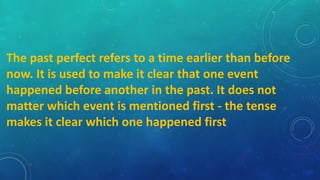Past perfect
- 1. PAST PERFECT
- 2. The past perfect refers to a time earlier than before now. It is used to make it clear that one event happened before another in the past. It does not matter which event is mentioned first - the tense makes it clear which one happened first
- 6. DICTATION âĒ PAST PERFECT + JUST âĒ 'Just' is used with the past perfect to refer to an event that was only a short time earlier than before now, e.g. âĒ The train had just left when I arrived at the station. âĒ She had just left the room when the police arrived. âĒ I had just put the washing out when it started to rain.
- 7. SPEAKING







